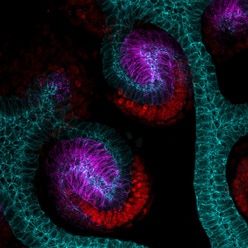 Acupuncturists understand the body as a complex system of energy systems, meridians and organs. However, when an acupuncturist talks about an organ, like the spleen, heart or kidneys, they are not referring to the physical organ that sits inside your body, but rather the energetic side of these organs. The energetic system is much bigger than just the physical organ, and governs certain functions in the body on many levels. The kidney system is one of the most important of these energetic organ systems. In Traditional Chinese Medicine, the kidneys represent the deepest, most fundamental levels of energy in the human body. They are said to be the root of yin and yang in the body - two fundamental forces at play in our physiology. The kidneys also store a substance called “essence” that is our genetic code, our life force and our reproductive ability. The kidneys in Chinese Medicine are related to the water element, which is the elemental energy of winter. Whereas many energy systems are all about movement, the kidneys are about rest, relaxation, rejuvenation - they are the energy of holding, of turning inward, of protecting that which is most important. Think of still reflecting pools, or a quiet winter night. These are kidney energy. The kidneys are often referred to in Chinese Medicine as our “root” - they are tasked with caring for the most precious parts of us that make us who we are. On a physical level, the kidneys govern the water passageways within the body (appropriate being the water element!) as well as controlling growth and reproduction. In a five element understanding of Chinese Medicine, the kidneys are at the end of the life cycle, before rebirth occurs again (such as winter making way for spring.) This means the kidneys in particular have a vital role to play in end of life transitions. The spirit aspect of the kidneys is called Zhi, or willpower. Again, the kidneys are our root, our fundamental and core energy. When that system is weakened, a person may not feel drive, motivation or have the ability to push themselves. Their understanding of who they are and what they can do has been diminished. The emotion associated with the kidneys is fear. When the kidneys are weak, a person may be startled or frightened easily, or may experience fear in disproportionate ways. Likewise, shock, trauma and fearful situations weaken the kidney energy, which is why many of the common symptoms of PTSD have a kidney imbalance at their root. The person’s core has been shaken. The kidney energy, being the deepest level of energy in the body, takes time to replenish and strengthen, which means patience is key. Also, the kidney energy naturally declines over the life cycle, which is the normal aging process. So as we age, protecting the kidneys becomes all the more important! Nourish the Kidneys through Food Being associated with the water element, the kidneys are nourished by foods that come from the water - fish, seaweeds and shellfish are nourishing to this system. The kidneys are associated with the salty taste, so naturally salty foods such as miso or millet also are good choices. Avoid foods that are damaging to your root energy, such as sugar, caffeine, alcohol, greasy foods and highly-processed foods. Nourish the Kidneys through your habits The kidneys are damaged by overwork, too much responsibility, lack of sleep and a frenetic schedule. In other words, most of us living in modern society are taxing our kidneys! This means it is all the more important to carve out time and space to take part in kidney-nourishing habits. As we mentioned, the kidneys are nourished through rest and rejuvenation. Pay attention to your sleep, and be sure you are getting the hours that you need! Take a nap in the day if you need it. Engage in gentle, relaxing forms of exercise, like yoga or tai chi. Try meditation or guided visualizations to calm and center yourself. Find a schedule that works - one that really works - for you. Bring the water element into your life and your home by getting a small decorative fountain, using essential oils, taking baths or spending time near rivers or oceans or other bodies of water. The kidneys, being the source of our reproductive strength, are also weakened by excessive sexual activity. So go for quality over quantity. The kidneys represent what makes you, you. So take the time to give them the support they need!  The organs in Chinese medicine are more than just a physical representation. The organs include not only their physiological function, but also their mental, emotional, spiritual and elemental qualities that align with nature and the seasons. Let’s explore the heart. The heart season is summer, and heart is considered the most yang: hot, bountiful and abundant. Yang is what is bright, moving, outward, hot and loud. Yin is what is more inward, still, dark and cooler. The color of the heart is associated with red, the climate is heat, the flavor is bitter and it’s paired organ is the small intestine (many urinary issues are due to “heart fire” heat descending). The sense aligned with heart is the tongue, and the vessels associated with heart are the tissues. The heart sound is laughing, and the emotion is joy. The heart houses what is known as the shen, which is the mind and spirit. You can see a person’s shen in a healthy complexion and radiant eyes that are clear and bright. The heart is in charge of circulation and keeps the tissues well nourished. It is also associated with mental clarity, memory and strength. The motion of this fire element is upward, like a flame. Many who have this element dominant in their personality have red hair that is curly or spikes upward. The heart is also connected to speech. An imbalance in heart energy can result in stuttering, speaking excitedly or talking excessively. A healthy heart energy exudes a sense of joy, fun, enthusiasm, action, warmth, charisma and fun. These people are the “life of the party,” and love to have a good time with friends and to be the center of attention. When the heart is balanced, sleep is sound and one is well rested. On the other hand, when there is an overabundance of fire this can result in restlessness, anxiety, sweating, excitability and symptoms such as palpitations, irregular heartbeat, insomnia, disturbing dreams, mouth sores, thirst, red face, constipation and dryness. This person might shrink if not in the limelight and would constantly seek attention and need activities that produce a lot of excitement. He or she might have trouble being introspective and could not be alone. “Overjoy” is an imbalance of heart energy and is likened to manic behavior. A dominant fire may also be extremely sensitive to heat. A lack of the fire element, on the other hand, can result in a lusterless complexion, low energy, inertia, depression, feeling cold, low libido and the personality may lack warmth. This type may seem cold, frigid, lack drive and may be prone to addictions. How to help your heart stay in balance? Red foods have been shown to help the heart biochemically; foods such as hawthorn berries, strawberries, cherries, raspberries, tomatoes, watermelon, peppers and goji berries keep your heart happy with lycopene and anthocyanin, antioxidants and beneficial vitamins. Other helpful foods include garlic, cayenne, cilantro, basil, magnesium (found in leafy greens, nuts and soy) and green tea. Also try ginseng, jujube dates, reishi mushrooms, dong quai, seaweed and schizandra berries. Calming activities such as walking, tai qi, or qi gong help calm the shen. It is best not to self-diagnose, so see your healthcare provider to see if those foods are right for you. You don't want to assume you have too much of one element and end up eating the wrong foods. A Chinese medical specialist can give you a proper diagnosis as far as the Five Element theory goes to see which element is dominant in you, and they can treat your condition with acupuncture, herbs and offer advice for beneficial changes in diet and lifestyle.  The season of winter is a time of slowing down and hibernation. According to Traditional Chinese Medical theory, the winter months are the perfect time to recharge your batteries and to start storing up the body’s vital energy reserves. The ancient Chinese believed humans should be at peace and in harmony with nature and follow the natural cycles of the seasons, while taking cues from the surrounding environment. Winter is dominated by the water element in TCM theory. The water element is associated with the kidneys, bladder and adrenal glands. The kidneys are considered the source of all energy or Qi (pronounced “chee”) found within the body. They store the reserves of Qi in the body for usage during times of stress and change. This Qi also helps in healing, preventing illness and graceful aging. Fundamentally, during the winter months, our bodies are following the cues of nature, which include rest, reflection, storage and conservation. During the winter months it is important to nourish the kidney qi, as this is also the time when this energy is most easily depleted. Some things that can help nourish the kidney qi include regular acupuncture treatments, moxibustion, proper diet, increased sleep and light exercise. TCM utilizes numerous modalities and tools to help keep the body balanced and prepped for the seasonal changes. Acupuncture and moxibustion are two of the tools that are regularly used to boost the kidney qi. Moxibustion is a practice where dried mugwort is burned very near the skin to warm and boost the Qi within the body. There are certain acupuncture points that are essential for boosting kidney qi. Most are located either on the lower abdomen, below the umbilicus or on the lower back above the hip bones, in the areas of the kidneys. Applying moxibustion to these areas is a wonderful way to boost the kidney’s energy reserves. Acupuncture can do essentially the same thing as moxibustion, but on a deeper level and it can physically affect the hormone levels of the adrenal glands, which sit just on top of the kidneys. When the adrenals are supported, they allow for balanced hormones throughout the body. This then helps the body use hormones properly without over-expenditure, thus preventing depletion of the body’s energy reserves. As the kidneys are closely associated and ruled by the water element, which is the element associated with winter, it is important to remember that water is essential. Drinking room temperature water is a vital step to keeping the kidney qi sufficient throughout the winter months. Eating darkly colored foods like blueberries, blackberries and black beans are also recommended during the winter months, as they boost the kidney qi. Warming foods like hearty soups, whole grains and roasted nuts also keep the body warm and nourished. Keeping the body warm, getting ample amounts of restful sleep and going to sleep early are all recommended during the winter months. Doing all of these things, getting regular acupuncture treatments and eating according to the season, will keep everybody healthy throughout the winter and when spring hits, energy reserves will be ample to take the body into the warmer months ahead. |
AuthorsRebecca M H Kitzerow is a Licensed Acupuncturist practicing in La Center, Washington. With over a decade of experience she has won 10 Nattie consumer choice awards from Natural Awakenings Magazine since 2014. Archives
July 2024
Categories
All
|
Photos from Hey Paul Studios, BeGreen_Studio, Pawel Pacholec, 1950sUnlimited, toulupaliaqaz, Joelk75, OnTask, Robert Gourley, cnu_sports, Mitya Ku, wuestenigel (CC BY 2.0), FootMassagez, 401(K) 2013, Mariana Heinz, @EdwardTerry, fishhawk, liverpoolhls, torbakhopper, Boemski, dolomitibl, Driscolltheque, Dave n Laura, Vaping360, MVWorks, Life Mental Health, MVWorks, mikefats, Scot Nelson, jfl1066, wZa HK, ruurmo, Guadalupe Cervilla, Army Medicine, GViciano, torbakhopper, adrigu, Saulo Cruz, Ben Cumming, marniejoyce, kcxd, JasonCorey, kanenas.net, Live to Create Photography, gm.esthermax, Unique Hotels Group, Zenspa1, mysiana, Tobias Lindman, Leader Nancy Pelosi, Kristoffer Trolle, swanksalot, Bill Selak, Parker Knight, stimpsonjake, Gedankensprudler, SuperFantastic, tonynetone, marniejoyce, JeepersMedia, Illusive Photography, 'Ajnagraphy', Iban Torras, scotted400, gtall1, dvanzuijlekom, BPPrice, Skley, torbakhopper, Renato Ganoza, anka.albrecht, QUOI Media, Public Domain Photos, Instant Vantage, Victor Tongdee, Free Grunge Textures - www.freestock.ca, sportEX journals, Nadja Tatar, angela n., marniejoyce, MVWorks, Karolina Kabat, Thomas Fisher Rare Book Library, UofT, ginnerobot, tracilawson, haven't the slightest, My Photo Journeys, Pierre Willemin, Florena_Presse, SuperFantastic, colindunn, zzkt, TraumaAndDissociation, ER24 EMS (Pty) Ltd., shixart1985 (CC BY 2.0), marniejoyce, Tomás Fano, freestock.ca ♡ dare to share beauty, Archives New Zealand, Jaykhuang, airdrie.m, Go-tea 郭天, OnTask, wuestenigel, focusonmore.com, Disney | ABC Television Group, Andrew Gustar, Didriks, ConstructionDealMkting, charlywkarl, barnimages.com, Lel4nd, runwaypilates, michaelstephanfotografie, McLevn, TraumaAndDissociation, eLife - the journal, Lars Plougmann, wuestenigel, shixart1985, boviate, davis.steve32, kevin dooley, @the.photoguy (insta), frederic.gombert, Feathering the Nest, Victor Tondee, shixart1985, wuestenigel, Joe K Gage, kennethkonica
 RSS Feed
RSS Feed
